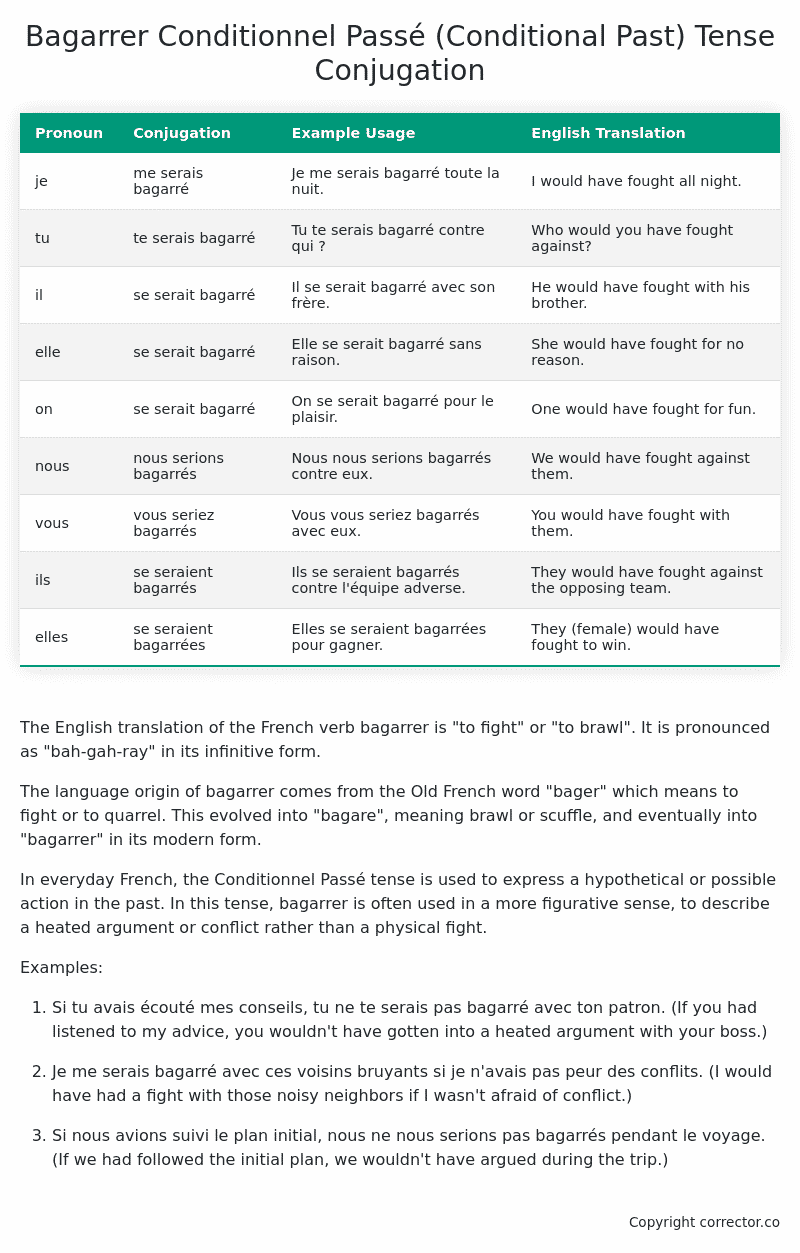Conditionnel Passé (Conditional Past) Tense Conjugation of the French Verb bagarrer
Introduction to the verb bagarrer
The English translation of the French verb bagarrer is “to fight” or “to brawl”. It is pronounced as “bah-gah-ray” in its infinitive form.
The language origin of bagarrer comes from the Old French word “bager” which means to fight or to quarrel. This evolved into “bagare”, meaning brawl or scuffle, and eventually into “bagarrer” in its modern form.
In everyday French, the Conditionnel Passé tense is used to express a hypothetical or possible action in the past. In this tense, bagarrer is often used in a more figurative sense, to describe a heated argument or conflict rather than a physical fight.
Examples:
-
Si tu avais écouté mes conseils, tu ne te serais pas bagarré avec ton patron. (If you had listened to my advice, you wouldn’t have gotten into a heated argument with your boss.)
-
Je me serais bagarré avec ces voisins bruyants si je n’avais pas peur des conflits. (I would have had a fight with those noisy neighbors if I wasn’t afraid of conflict.)
-
Si nous avions suivi le plan initial, nous ne nous serions pas bagarrés pendant le voyage. (If we had followed the initial plan, we wouldn’t have argued during the trip.)
Table of the Conditionnel Passé (Conditional Past) Tense Conjugation of bagarrer
| Pronoun | Conjugation | Example Usage | English Translation |
|---|---|---|---|
| je | me serais bagarré | Je me serais bagarré toute la nuit. | I would have fought all night. |
| tu | te serais bagarré | Tu te serais bagarré contre qui ? | Who would you have fought against? |
| il | se serait bagarré | Il se serait bagarré avec son frère. | He would have fought with his brother. |
| elle | se serait bagarré | Elle se serait bagarré sans raison. | She would have fought for no reason. |
| on | se serait bagarré | On se serait bagarré pour le plaisir. | One would have fought for fun. |
| nous | nous serions bagarrés | Nous nous serions bagarrés contre eux. | We would have fought against them. |
| vous | vous seriez bagarrés | Vous vous seriez bagarrés avec eux. | You would have fought with them. |
| ils | se seraient bagarrés | Ils se seraient bagarrés contre l’équipe adverse. | They would have fought against the opposing team. |
| elles | se seraient bagarrées | Elles se seraient bagarrées pour gagner. | They (female) would have fought to win. |
Other Conjugations for Bagarrer.
Le Present (Present Tense) Conjugation of the French Verb bagarrer
Imparfait (Imperfect) Tense Conjugation of the French Verb bagarrer
Passé Simple (Simple Past) Tense Conjugation of the French Verb bagarrer
Passé Composé (Present Perfect) Tense Conjugation of the French Verb bagarrer
Futur Simple (Simple Future) Tense Conjugation of the French Verb bagarrer
Futur Proche (Near Future) Tense Conjugation of the French Verb bagarrer
Plus-que-parfait (Pluperfect) Tense Conjugation of the French Verb bagarrer
Passé Antérieur (Past Anterior) Tense Conjugation of the French Verb bagarrer
Futur Antérieur (Future Anterior) Tense Conjugation of the French Verb bagarrer
Subjonctif Présent (Subjunctive Present) Tense Conjugation of the French Verb bagarrer
Subjonctif Passé (Subjunctive Past) Tense Conjugation of the French Verb bagarrer
Subjonctif Imparfait (Subjunctive Imperfect) Tense Conjugation of the French Verb bagarrer
Subjonctif Plus-que-parfait (Subjunctive Pluperfect) Tense Conjugation of the French Verb bagarrer
Conditionnel Présent (Conditional Present) Tense Conjugation of the French Verb bagarrer
Conditionnel Passé (Conditional Past) Tense Conjugation of the French Verb bagarrer (this article)
L’impératif Présent (Imperative Present) Tense Conjugation of the French Verb bagarrer
L’infinitif Présent (Infinitive Present) Tense Conjugation of the French Verb bagarrer
Struggling with French verbs or the language in general? Why not use our free French Grammar Checker – no registration required!
Get a FREE Download Study Sheet of this Conjugation 🔥
Simply right click the image below, click “save image” and get your free reference for the bagarrer Conditionnel Passé tense conjugation!

Bagarrer – About the French Conditionnel Passé (Conditional Past) Tense
Formation
Common Everyday Usage Patterns
Expressing Unreal Past Scenarios
Polite Requests or Suggestions
Expressing Doubt or Uncertainty
Interactions with Other Tenses
Conditional Present
Indicative Past Tenses
Conditional Future
Summary
Want More?
I hope you enjoyed this article on the verb bagarrer. Still in a learning mood? Check out another TOTALLY random French verb conjugation!


